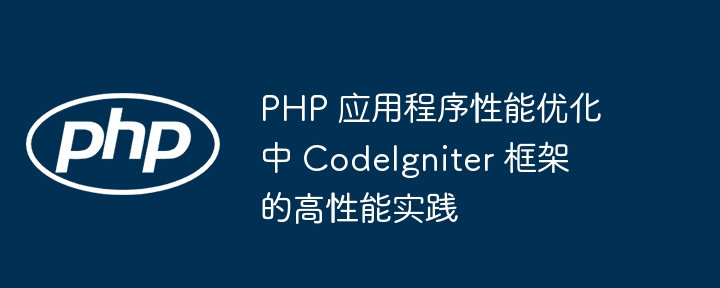
CodeIgniter framework improves PHP application performance through the following practices: Enable APC caching to speed up PHP code execution. Use database cache to store the results of frequent queries and avoid database interactions. Optimize queries to reduce unnecessary data retrieval and use appropriate indexes. Reduce the number of HTTP requests through CSS sprites and Ajax partial updates. Cache logged-in user data to avoid repeated database queries and improve login speed.

High performance practices of CodeIgniter framework in PHP application performance optimization
Overview
CodeIgniter is a lightweight and efficient PHP framework that provides multiple ways to optimize application performance. This article explores some high-performance practices to help you build fast and responsive applications using CodeIgniter.
Enable APC cache
APC (Alternative PHP Cache) is an extension for caching PHP intermediate code. It can significantly increase the execution speed of your scripts. In CodeIgniter, APC caching can be enabled by following these steps:
$config['cache_dir'] value in the config.php file. Run the following command:
~$ php-fpm -r "apc_clear_cache();"
Use database cache
CodeIgniter provides a built-in database cache, It allows the results of häufig queries to be stored in cache, thus avoiding expensive database queries. To use the database cache, set $config['query_cache_enabled'] to TRUE in the config.php file.
Optimize queries
Avoid using * as it retrieves unnecessary data. Use index fields to filter in queries and make sure you use the correct join type. CodeIgniter provides several query building functions, such as get(), result(), and row(), to optimize queries.
Reduce HTTP Requests
Minimize the number of HTTP requests sent to the server when loading a page. Use CSS sprites or image combinations to reduce image requests. Use Ajax to update parts of the page instead of reloading the entire page.
Practical case: caching logged in user data
Suppose you are building a user login system. To optimize performance, you can use CodeIgniter to cache logged-in user information. Here's how to implement it:
function login_user() {
// 根据用户名和密码验证用户
$user = $this->db->get_where('users', ['username' => $this->input->post('username'), 'password' => md5($this->input->post('password'))])->row();
if ($user) {
// 设置缓存,持续时间为 30 分钟
$cache_data = [
'id' => $user->id,
'username' => $user->username,
'email' => $user->email
];
$this->cache->save('user_data', $cache_data, 1800);
}
return $user;
}Now you can quickly get the logged in user's information by retrieving the data from the cache, without the need for additional database queries:
function get_logged_in_user() {
return $this->cache->get('user_data');
}Conclusion
By implementing these high-performance practices, you can build efficient and responsive PHP applications using the CodeIgniter framework. pamiętaj, Proper profiling and monitoring to identify and resolve potential performance issues is also important.
The above is the detailed content of High-performance practices of CodeIgniter framework in PHP application performance optimization. For more information, please follow other related articles on the PHP Chinese website!